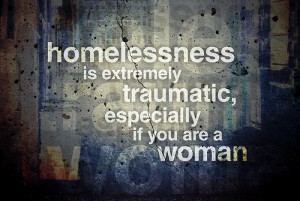 Depression and sciatica were the ‘perfect storm’ that took Michelle* from stable housing to becoming a homeless woman. Originally from Texas, she’d moved to the Puget Sound region to be with her family and was looking forward to continuing her employment as a teacher. Her battle with mental illness and the physical pain of her disease eventually become too much and prevented her from working.
Depression and sciatica were the ‘perfect storm’ that took Michelle* from stable housing to becoming a homeless woman. Originally from Texas, she’d moved to the Puget Sound region to be with her family and was looking forward to continuing her employment as a teacher. Her battle with mental illness and the physical pain of her disease eventually become too much and prevented her from working.
“I saw my income quickly dropping and made the mistake of renting a room sight unseen,” says Michelle. “The living conditions were unbearable, and I had to get out. I ended up making some bad decisions. I didn’t realize I’d become a homeless woman that fast.”
Michelle found herself living in a park in Port Orchard during the summer of 2014. Because of a lack of shelter options on the Olympic Peninsula, she returned to Seattle. She bounced around from shelter to shelter for the next 12 months, which added to the stress of her aliments.
“Homelessness is extremely traumatic, especially if you are a woman,” says Michelle. “You are very vulnerable to all sorts of situations, and it’s very scary. It’s hard to think straight sometimes. You really need to find some place safe each night.”
In April of 2015, she found the Washington State Department of Social and Health Services Division of Vocational Rehabilitation (DVR). DVR helps individuals with disabilities participate fully in their communities and become employed. DVR helped her with fees associated with updating her teaching certificate, and most importantly, referred her to JFS.

The case management team at JFS went through an assessment of her barriers to employment, and housing quickly rose to the top. Together, they helped Michelle fill out more than 60 applications for stable housing.
“There’s a two to seven year waiting list for affordable housing in Seattle right now,” says Christy Rosenlund, SAJD Supported Living Program Case Manager. “Once people are on the waiting list, they have to check in monthly, which can be extremely difficult for someone who has an unstable living situation.”
Christy and Michelle worked closely together for the next four months and once housing was found, they turned to the JFS Emergency Services program for financial help covering her first month’s rent.
“JFS does extremely good work,” says Michelle. “They played an instrumental role in getting me into more stable housing. I’m finally starting to pick up the pieces and get my medical condition under control. Your home is your nest, your security. I’m so glad I’ve got a roof over my head.”
Michelle has been in stable housing in the Central District for the past six months. She enjoys her new neighborhood and hopes to be able to return to substitute teaching in the near future.
*This client’s name has been changed.
 By Leslie Sugiura
By Leslie Sugiura
Savvy cook, extreme clam digger, urban gardener and mom to Stella the dog are just a few of the titles Leslie Sugiura keeps in rotation. She’s also the Director of Special Events for JFS where she spearheads the annual Community of Caring Luncheon.



